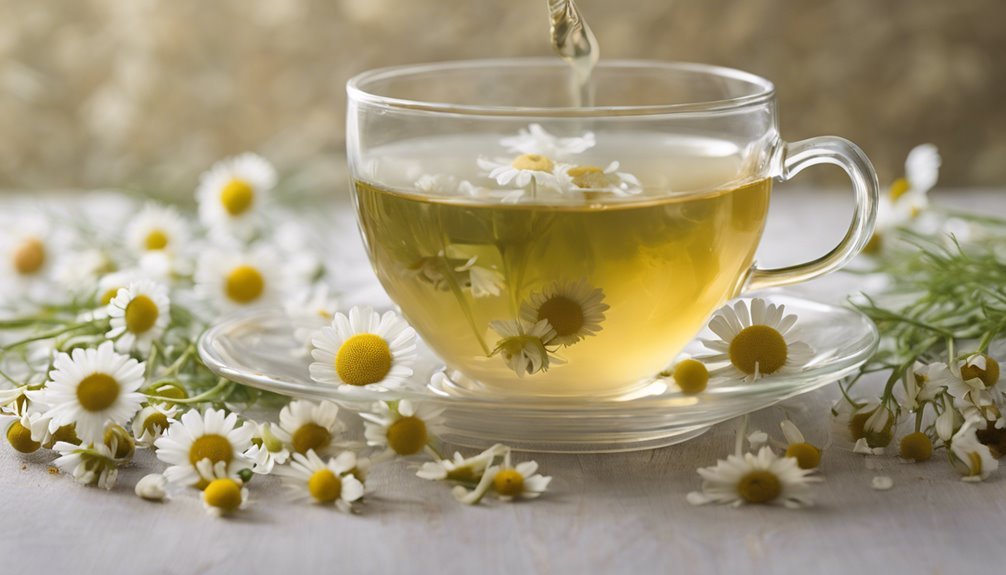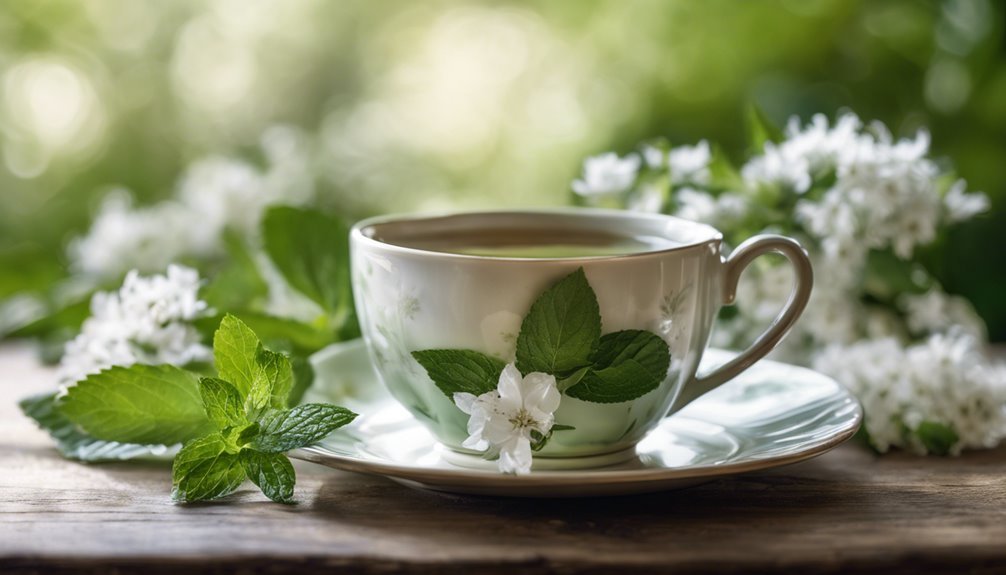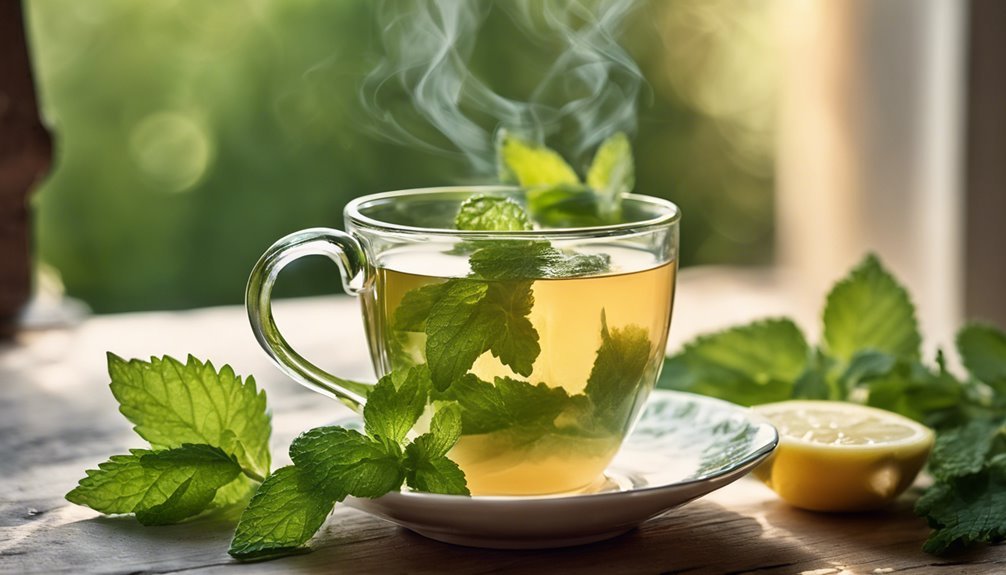"Cherishing Little Steps - A Haven for Baby and Family Journeys"
The Best Herbal Teas for Nursing Moms
Did you know that nearly 80% of new mothers start breastfeeding but often encounter challenges like low milk supply? You're likely searching for natural ways to boost lactation and herbal teas might be just what you need. Herbs like fenugreek, fennel, and blessed thistle have been traditionally used to enhance milk production. However, before you sip your way to increased supply, it's crucial to understand which teas are safe and effective. While some are widely recommended, others may not be suitable for everyone. So, what exactly should you look for in a herbal tea when you're a nursing mom?
Key Takeaways
- Fenugreek tea enhances milk supply and is recommended at 1-2 cups daily for nursing mothers.
- Fennel tea supports lactation and alleviates digestive discomfort for mother and baby.
- Anise and milk thistle tea boost milk production and support liver health during the postpartum period.
- Chamomile tea offers calming effects, aids digestion, and reduces inflammation, suitable for daily consumption.
- Nettle tea is nutrient-rich, promoting recovery by replenishing essential minerals and supporting kidney health.
Fenugreek Tea Benefits
Fenugreek tea, a staple in herbal medicine cabinets, offers remarkable benefits for nursing mothers. When you're looking to enhance your milk supply naturally, this tea could be a comforting and effective solution.
It's crucial, however, to understand the right preparation and dosage to maximize its benefits while ensuring safety.
To prepare fenugreek tea, you'll need about one teaspoon of fenugreek seeds. Crush these lightly to release their flavor and active compounds. Boil water and pour it over the seeds, allowing them to steep for about five to ten minutes. This method extracts the vital ingredients needed to potentially boost lactation.
As for the dosage, starting with one cup of fenugreek tea a day is recommended. Monitor how your body responds, as everyone reacts differently to herbal treatments. If well-tolerated but more effect is desired, you might increase to two cups daily.
Always consult with a healthcare provider before adjusting the dosage, especially if you're new to fenugreek or have underlying health conditions.
Fennel Tea Advantages
Continuing with our focus on beneficial herbal teas for nursing moms, fennel tea emerges as another excellent choice. You'll find that fennel tea benefits you in various ways, particularly during the postpartum period. This tea is renowned for its ability to support healthy lactation, potentially enhancing milk production which is vital if you're breastfeeding.
Fennel tea, made from the seeds of the fennel plant, is rich in anethole, which is believed to mimic the properties of the estrogen hormone, thus promoting milk secretion. Moreover, it can help alleviate digestive issues, reducing gas and bloating not just in you but also in your baby when breastfeeding. This can lead to more comfortable feeding sessions and less fussiness from your little one.
When it comes to fennel tea safety, it's generally considered safe in moderate amounts. However, it's always wise to consult your healthcare provider before adding it or any new herbal tea to your diet, especially when you're nursing.
They can provide guidance tailored to your specific health needs, ensuring that you and your baby receive the best possible care.
Ginger Tea Uses

Switching gears to another beneficial herb, let's explore the uses of ginger tea for nursing moms. Ginger tea is renowned for its remarkable health benefits, especially in aiding digestion and combating nausea, which can be particularly useful after pregnancy.
Ginger tea benefits you by soothing your stomach and reducing feelings of nausea, a common postpartum symptom. It's a gentle, natural way to find relief without resorting to medication. Moreover, ginger's anti-inflammatory properties can help calm minor aches and pains, which is a boon when you're coping with the physical demands of caring for a newborn.
However, it's important to ensure ginger tea safety. Moderation is key. Too much ginger can lead to discomfort and potential side effects such as heartburn or irritation. Here's a quick guide to help you balance it right:
| Quantity of Ginger | Frequency | Expected Benefit |
|---|---|---|
| 1-2 grams | Once a day | Reduces nausea |
| 2-3 grams | Twice a day | Aids digestion |
| 3-4 grams | Not recommended | May cause discomfort |
Nettle Tea Insights
Many nursing moms find nettle tea to be a superb choice for enhancing their overall well-being postpartum. Loaded with iron, calcium, and vitamins A and K, nettle tea supports your recovery and boosts your vitality. Not only does it replenish essential nutrients, but it also enhances nutrient absorption, ensuring you get the most out of your meals.
If you're worried about low iron levels, which are common after childbirth, introducing nettle tea into your daily routine can be a game-changer. It's not just about replacing lost minerals; it's about making every nutrient count. By improving how your body absorbs nutrients, nettle tea helps you regain your strength more effectively.
Moreover, nettle tea is known for its anti-inflammatory properties, which can be particularly soothing during this sensitive period. It supports kidney health and fluid balance, reducing feelings of fatigue and bloating.
Remember, while nettle tea is beneficial, it's important to consult with a healthcare provider before adding any new herbal tea to your diet, especially when you're nursing.
Incorporating nettle tea can be a simple, yet powerful way to care for your body while you nurture your newborn. Embrace this natural ally and feel empowered in your postpartum journey.
Chamomile Tea Properties

While nettle tea offers robust benefits for nutrient replenishment, chamomile tea provides a different type of support for nursing moms. Chamomile tea, renowned for its gentle soothing qualities, can be a comforting choice during the postpartum period.
It's known for its calming effects, which can be particularly helpful for you when sleep seems elusive and the demands of motherhood feel overwhelming.
Chamomile tea benefits extend to aiding digestion and reducing inflammation, which can be a boon if you're experiencing postnatal digestive issues. The mild sedative properties might also help soothe your baby, as some of the calming compounds can pass through breast milk.
However, it's crucial to consider chamomile tea safety. Generally, it's safe in moderate amounts, which means one to two cups a day should be fine. Yet, it's important to consult with your healthcare provider before adding it to your routine, especially if you're on medication, as chamomile can interact with certain drugs.
Also, be alert for any allergic reactions, as chamomile belongs to the ragweed family, which is known for its allergenic potential.
Embracing chamomile tea could offer you soothing relief and a moment of peace amidst the beautiful chaos of nursing and motherhood.
Raspberry Leaf Tea Perks
Turning now to raspberry leaf tea, it stands out as a notable herbal remedy often recommended during the later stages of pregnancy and postpartum recovery. You might find raspberry leaf particularly beneficial as it can aid in strengthening the uterine walls and potentially shorten labor.
It's also thought to help with post-delivery recovery, providing a smoother transition for your body during this intense period.
Raspberry leaf tea is rich in vitamins and minerals such as magnesium, potassium, and iron, which are crucial for your postpartum body. Drinking this tea might help you replenish essential nutrients more efficiently, supporting overall health and vitality.
Additionally, raspberry leaf plays a role in promoting hormonal balance. This is key as your body adjusts back to its non-pregnant state.
A balanced hormonal level can lead to a more regular menstrual cycle and improved emotional health, which is invaluable when you're adapting to life with a new baby.
Peppermint Tea Features

Peppermint tea is a refreshing choice that can be particularly soothing for nursing moms. Known for its cooling and calming properties, it can help you relax during what can sometimes be a stressful period.
One of the key peppermint tea benefits is its ability to ease digestive troubles—a common issue for postpartum women. It's naturally caffeine-free, so you won't have to worry about it affecting your baby's sleep patterns.
Another great advantage is its potential to enhance your mood and reduce fatigue, making your days and nights a bit easier.
If you're looking for ways to incorporate it into your routine, there are several peppermint tea recipes that are both delicious and simple to prepare. A basic recipe involves steeping fresh or dried peppermint leaves in hot water for about five to ten minutes, depending on how strong you prefer your tea. You can also add a slice of lemon or a dash of honey for an extra touch of flavor.
Dandelion Tea Contributions
Throughout your nursing journey, dandelion tea offers remarkable benefits that can enhance your health and well-being. This humble weed, often overlooked, is a powerhouse for mothers like you, striving to nourish and replenish their bodies during postpartum and breastfeeding periods.
Dandelion root, the key component of this tea, acts as a mild diuretic, helping to reduce water retention without depleting your potassium levels. This is crucial as maintaining a balanced electrolyte status is essential for both your and your baby's health.
Moreover, dandelion is rich in antioxidants, which support your liver function, crucial for detoxifying after childbirth. The dandelion benefits don't stop there. It also contains significant amounts of vitamins A, C, D, and B-complex, which are vital for your recovery and daily vitality.
Plus, the high levels of iron and calcium support your nutritional needs, particularly beneficial when you're sharing your body's resources with your breastfeeding infant.
Integrating dandelion tea into your daily routine can be a simple yet effective step towards a healthier postpartum experience. It's a natural, supportive way to boost your vitality and continue serving your baby with the best care possible.
Lemon Balm Tea Effects

Lemon balm tea offers a soothing escape for nursing moms, providing a gentle nudge towards relaxation and calm. This delightful herb is renowned not only for its calming effects but also for its ability to support digestion, which can be particularly beneficial during the postpartum period.
When you sip on lemon balm tea, you're engaging in a ritual that quiets the mind and eases the body. Its mild sedative properties can help alleviate stress and anxiety, making it easier for you to focus on both your needs and those of your baby.
The tea's ability to enhance your mood comes from its potential to increase levels of GABA, a neurotransmitter in the brain that promotes relaxation.
Moreover, lemon balm can aid in digestion, soothing the stomach and reducing symptoms of indigestion and bloating. This is especially helpful when you're adjusting to new dietary routines post-birth.
Blessed Thistle Tea Potentials
Blessed thistle tea, often overlooked, holds remarkable benefits for nursing mothers seeking natural support during their postpartum journey. If you're exploring methods to enhance your milk production and overall well-being, this herbal tea might just be what you need.
Blessed thistle is known for its potential to increase milk supply. Its active components may help stimulate the production of breast milk, making it a popular choice among new mothers. Moreover, the anti-inflammatory properties of blessed thistle can aid in reducing inflammation, which is a boon if you're dealing with postpartum discomfort.
Let's look at the recommended dosage and key benefits more closely:
| Aspect | Benefit | Recommended Dosage |
|---|---|---|
| Milk Production | May increase lactation | 1-3 cups daily |
| Digestive Health | Supports digestion, reduces gas | As needed, consult |
| Anti-inflammatory | Helps reduce postpartum swelling | Regular intake advised |
As you consider adding blessed thistle tea to your routine, remember it's important to consult with a healthcare provider to ensure it's right for you, especially considering dosage and any potential interactions with other medications you might be taking. Embrace this natural aide and enhance your nurturing journey with confidence and care.
Anise Tea for Lactation

While blessed thistle tea has its unique advantages for nursing moms, anise tea also offers significant benefits, particularly in enhancing lactation. Anise tea, known for its distinct, licorice-like flavor, can be a comforting and effective choice if you're looking to boost your milk supply naturally.
Here's how anise tea can support you in your lactation journey:
- Enhances Milk Production: Anise tea is traditionally used to increase milk production. Its natural compounds mimic the effects of estrogen, potentially promoting greater breast milk yield.
- Relieves Digestive Issues: Not only can it help you, but it's also great for your baby. Anise tea is known to aid in digestion and can alleviate gas and colic symptoms in infants, making it a dual-benefit tea for postpartum care.
- Calming Properties: The soothing effect of anise tea can help reduce stress and promote relaxation, which is crucial for effective lactation.
When incorporating anise tea into your routine, it's important to consume it in moderation and consult with your healthcare provider to ensure it complements your overall lactation support plan.
Milk Thistle Tea Advantages
Transitioning from anise tea, you'll find that milk thistle tea offers its own array of benefits, particularly for nursing mothers seeking natural lactation support.
Milk thistle, scientifically known as Silybum marianum, has been used for centuries due to its potent herbal properties, and it stands out as a powerful ally for your postpartum health.
One of the primary milk thistle benefits is its ability to enhance lactation. Compounds in milk thistle, especially silymarin, are believed to promote milk production, providing crucial support when you're trying to establish a steady milk supply for your baby.
This isn't only beneficial for the quantity but also the quality of your milk, ensuring that your little one gets all the necessary nutrients.
Moreover, milk thistle is known for its hepatoprotective properties, meaning it helps protect the liver.
This is particularly important for you post-delivery as the liver plays a crucial role in hormone regulation and detoxification, processes that are vital during the postpartum period.
Frequently Asked Questions
How Quickly Do Herbal Teas Impact Milk Production?
You might notice an increase in milk production within a few days to a week after starting herbal teas.
These beverages are renowned for their herbal efficacy and nursing benefits.
However, everyone's body reacts differently, so it's important to monitor your response and consult with a healthcare provider to ensure the best results.
Make sure you're choosing teas known for their safety and effectiveness in boosting milk supply.
Can Herbal Teas Cause Allergic Reactions in Babies?
Yes, herbal teas can cause allergic reactions in babies.
When you drink teas containing certain herbs, these can pass into your breast milk and potentially lead to sensitivities or allergies in your baby.
Watch for signs like fussiness, rashes, or digestive issues after consuming herbal teas.
Always consult your pediatrician before adding new herbs to your diet, and consider starting with small amounts to monitor your baby's reaction.
Are There Herbal Teas That Should Be Avoided While Nursing?
Yes, there are specific herbal teas you should avoid while nursing.
It's crucial for your baby's safety to steer clear of teas containing black cohosh, ephedra, and ginseng.
Adhering to nursing guidelines, prioritize herbal tea safety by choosing mild, beneficial options like fenugreek or fennel.
These selections support lactation without risking adverse effects.
Always consult with a healthcare provider before integrating new herbal teas into your diet while breastfeeding.
How Many Cups of Herbal Tea Can I Drink Daily?
You can generally enjoy 2-3 cups of herbal tea daily.
Keep an eye on caffeine content in some varieties, like green tea, which might affect your baby.
Herbal teas offer great hydration benefits, crucial when you're nursing.
It's important to select teas that are safe and beneficial for lactation.
Always check with your healthcare provider to ensure any herbal tea choice aligns with your specific health needs and dietary requirements.
Can Herbal Teas Replace Medical Lactation Treatments?
You shouldn't rely solely on herbal teas to replace medical lactation treatments.
While they offer some herbal benefits, they're not substitutes for professional medical advice or treatments proven to enhance lactation safety and effectiveness.
It's always best to consult with your healthcare provider to discuss your specific needs and the safest options for boosting your milk supply.
Conclusion
So there you have it, you marvelous milk-making maven! Whether you're looking to boost your supply with a splash of fenugreek, ease that tummy with a touch of ginger, or calm the chaos with some chamomile, there's a tea for every postpartum predicament. Remember, while you're doing the heavy lifting (and nursing!), let these herbal heroes lighten your load. Just be sure to chat with your doc before brewing to keep it safe and sound for you and your little one.




